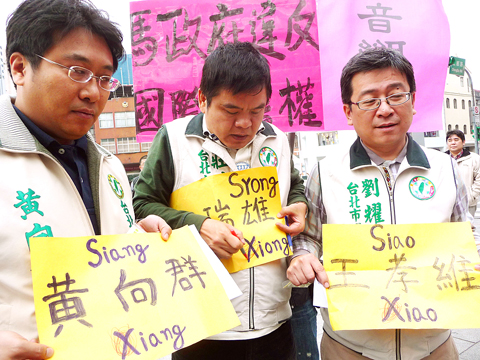The Taiwan Pinyin League yesterday called on the Control Yuan to impeach Premier Liu Chao-shiuan (劉兆玄), Minister Without Portfolio Ovid Tzeng (曾志朗) and Minister of Education Cheng Jei-cheng (鄭瑞城) over their decision to replace Tongyong Pinyin with Hanyu Pinyin as the national standard Romanization system.
On International Mother Language Day yesterday, the Taiwan Pinyin League and its head Yu Bor-chuan (余伯泉), who led the team that designed Tongyong Pinyin, staged a rally to protest the government’s decision to adopt Hanyu Pinyin, saying it violated the Universal Declaration of Linguistic Rights.

PHOTO: CNA
IDEOLOGY
Yu said President Ma Ying-jeou (馬英九) was being guided by his ideology in replacing Tongyong Pinyin with Hanyu Pinyin, which would cost the nation between NT$7 billion (US$210 million) and NT$8 billion at a time when the public is struggling to make a living because of the recession.
Ma’s administration favors Hanyu Pinyin — invented in China — over Tongyong Pinyin because it belittles Taiwanese, Yu said.
WASTE
He said it would be a waste of money to replace Tongyong Pinyin with Hanyu Pinyin nationwide as a survey conducted by the education ministry showed that only 6 percent of the nation’s transliterations used pinyin.
Making the statement near the Taipei MRT’s Ximen station, Democratic Progressive Party Taipei City councilors Chuang Jui-hsiung (莊瑞雄) and Liu Yao-ren (劉耀仁) covered the letter “X” on the Ximen Station nameplate with an “S” sticker.
The councilors urged the government to at least adopt both Hanyu Pinyin and Tongyong Pinyin at the same time for use on road signs and street names.
Taipei Rapid Transit Corporation staffers at Ximen Station later removed the “S” sticker.
Ling Chi-yao (陵啟堯), a spokesman for the company, said that changing station names was up to the Taipei City Government because the company was owned by the government.

The High Prosecutors’ Office yesterday withdrew an appeal against the acquittal of a former bank manager 22 years after his death, marking Taiwan’s first instance of prosecutors rendering posthumous justice to a wrongfully convicted defendant. Chu Ching-en (諸慶恩) — formerly a manager at the Taipei branch of BNP Paribas — was in 1999 accused by Weng Mao-chung (翁茂鍾), then-president of Chia Her Industrial Co, of forging a request for a fixed deposit of US$10 million by I-Hwa Industrial Co, a subsidiary of Chia Her, which was used as collateral. Chu was ruled not guilty in the first trial, but was found guilty

DEADLOCK: As the commission is unable to forum a quorum to review license renewal applications, the channel operators are not at fault and can air past their license date The National Communications Commission (NCC) yesterday said that the Public Television Service (PTS) and 36 other television and radio broadcasters could continue airing, despite the commission’s inability to meet a quorum to review their license renewal applications. The licenses of PTS and the other channels are set to expire between this month and June. The National Communications Commission Organization Act (國家通訊傳播委員會組織法) stipulates that the commission must meet the mandated quorum of four to hold a valid meeting. The seven-member commission currently has only three commissioners. “We have informed the channel operators of the progress we have made in reviewing their license renewal applications, and

Taiwan People’s Party (TPP) Chairman Huang Kuo-chang (黃國昌) yesterday appealed to the authorities to release former Taipei mayor Ko Wen-je (柯文哲) from pretrial detention amid conflicting reports about his health. The TPP at a news conference on Thursday said that Ko should be released to a hospital for treatment, adding that he has blood in his urine and had spells of pain and nausea followed by vomiting over the past three months. Hsieh Yen-yau (謝炎堯), a retired professor of internal medicine and Ko’s former teacher, said that Ko’s symptoms aligned with gallstones, kidney inflammation and potentially dangerous heart conditions. Ko, charged with

Taiwan-based publisher Li Yanhe (李延賀) has been sentenced to three years in prison, fined 50,000 yuan (US$6,890) in personal assets and deprived political rights for one year for “inciting secession” in China, China's Taiwan Affairs Office spokesman Chen Binhua (陳斌華) said today. The Shanghai First Intermediate People’s Court announced the verdict on Feb. 17, Chen said. The trial was conducted lawfully, and in an open and fair manner, he said, adding that the verdict has since come into legal effect. The defendant reportedly admitted guilt and would appeal within the statutory appeal period, he said, adding that the defendant and his family have